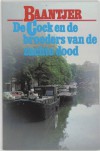The Waves
 First sentence: "The sun had not yet risen."
First sentence: "The sun had not yet risen."P. 99: "'The breath of the wind was like a tiger panting', said Rhoda."
Last sentence: "How many telephone calls, how many postcards, are now needed to cut this hole th"
Plot Summary (Wikipedia):
The Waves is Woolf's most experimental novel. It consists of soliloquies spoken by the book's six characters: Bernard, Susan, Rhoda, Neville, Jinny, and Louis. Also important is Percival, the seventh character, though readers never hear him speak through his own voice. The monologues that span the characters' lives are broken up by nine brief third-person interludes detailing a coastal scene at varying stages in a day from sunrise to sunset.
As the six characters or "voices" alternately speak, Woolf explores concepts of individuality, self, and community. Each character is distinct, yet together they compose a gestalt about a silent central consciousness. Bernard is a story-teller, always seeking some elusive and apt phrase (some critics see Woolf's friend E. M. Forster as an inspiration); Louis is an outsider, who seeks acceptance and success (some critics see aspects of T. S. Eliot, whom Woolf knew well, in Louis); Neville (who may be partially based on another of Woolf's friends, Lytton Strachey) desires love, seeking out a series of men, each of whom become the present object of his transcendent love; Jinny is a socialite, whose Weltanschauung corresponds to her physical, corporeal beauty; Susan flees the city, in preference for the countryside, where she grapples with the thrills and doubts of motherhood; and Rhoda is riddled with self-doubt and anxiety, always rejecting and indicting human compromise, always seeking out solitude . Percival (partially based on Woolf's brother, Thoby Stephen) is the god-like but morally flawed hero of the other six, who dies midway through the novel on an imperialist quest in British-dominated colonial India. Although Percival never speaks through a monologue of his own in The Waves, readers learn about him in detail as the other six characters repeatedly describe and reflect on him throughout the book.
The novel follows its six narrators from childhood through adulthood. Woolf's novel is concerned with the individual consciousness and the ways in which multiple consciousnesses can weave together.
When I saw that this was Woolf's most experimental novel, I wanted to read it right away, because I love experimental novels... that is, until I start reading them. I do appreciate them, but I am afraid I do not have the patience to read them slowly and to pause in order to think about what I just read. The best thing for me would be reading this together with someone else who could explain what I was reading exactly andwho would draw my attention to the uniqueness of phrases and literary techniques and so on. Because, this really interests me... but as I said, unfortunately I don't have the patience to think about it myself.
Other thoughts/reviews:
Shelf Love: http://shelflove.wordpress.com/2013/04/16/the-waves/





